|
|
|
Sort Order |
|
|
|
Items / Page
|
|
|
|
|
|
|
| Srl | Item |
| 1 |
ID:
167010


|
|
|
|
|
| Summary/Abstract |
Behavioural interventions, such as informational nudges, have become an increasingly popular strategy in demand-side energy management. In particular, home energy reports (HERs) have been used to induce behavioural change among residential consumers. These HERs typically provide peer comparisons of energy use and information about energy savings opportunities. Despite the growing prevalence of HERs and a shift from postal to electronic delivery of HERs, the experimental evidence base of their effectiveness comes primarily from HERs delivered by post from a single vendor (Opower). Whether that evidence generalises to other programmes and to the electronic delivery of HERs is unclear. This paper reports new evidence for HER effectiveness from a 12-month field experiment with approximately 9,000 households that tested electronic HER programme in a deregulated American residential electricity market. Despite high non-compliance with HER delivery, the programme reduced household electricity consumption by 2.9%, 95% CI [-5.0%, −0.76%]. This estimated reduction is consistent with prior estimated impacts of HERs delivered by post and implies electronic HERs are at least as effective as reports delivered by post in reducing electricity consumption, while they are administered at a lower cost.
|
|
|
|
|
|
|
|
|
|
|
|
|
|
|
|
| 2 |
ID:
123775
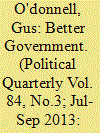

|
|
|
|
|
| Publication |
2013.
|
| Summary/Abstract |
The decline in future trend economic growth coupled with the ever increasing demands of an ageing population mean the public sector will need to deliver better for less. This will require a smarter bureaucracy using the latest behavioural advances and using wellbeing as a measure of success. Spending will need to be directed more to prevention rather than cure. Radical tax and benefit reform is needed to make work pay and offset the rise in inequality.
Decision making could be improved by attracting more diverse, experienced people into politics by, for example, more use of open primaries, a level playing field for independent candidates and better training. Ministers could be set proper objectives and have constructive appraisals.
A proposed Office of Taxpayer Responsibility could screen policies to avoid the worst ones, backed by no evidence, from being introduced as it is very hard to abolish bad policies.
|
|
|
|
|
|
|
|
|
|
|
|
|
|
|
|
| 3 |
ID:
166324
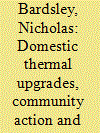

|
|
|
|
|
| Summary/Abstract |
A three-year field experiment was conducted with 185 prosperous households to assess whether behavioural interventions by a community environmental group during and after thermal upgrades (cavity wall and/or loft insulation) can achieve reductions in households’ energy use, including reductions in direct and indirect rebound. The engineering interventions on the thermal efficiency of dwellings appear effective in reducing energy use in both treatment and control groups: a direct rebound effect is estimated to be at most 40 per cent from the engineering interventions. However, across a range of measures of energy use, we observe no significant effect of the community behavioural intervention across the total lifetime of the project. Qualitative data collected on similar community groups suggests substantial constraints on their capacity to realise reductions in energy use amongst households.
|
|
|
|
|
|
|
|
|
|
|
|
|
|
|
|
| 4 |
ID:
122485
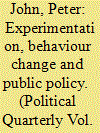

|
|
|
|
|
| Publication |
2013.
|
| Summary/Abstract |
Citizens will need to change their behaviour in pro-social ways if governments are to address current challenges in public policy. But how best to promote behaviour change? The argument in this article is that a decentralised rather than a top-down approach is particularly suitable, which can encourage innovation in the public sector and involve citizens in the implementation of policies. As a method of evaluating interventions, randomised controlled trials have a unique role to play in improving the design of policies, particularly if carried out responsively and adaptively. A culture of experimentation would value curiosity, feedback and the continual testing of interventions. The article includes three examples of experimentation: young people's political attitudes, voter turnout and donations for charity. As the popularity of 'nudge' interventions grows-shown by the success of the UK government's Behavioural Insights Team-the practice of experimentation in the public sector could become the norm.
|
|
|
|
|
|
|
|
|
|
|
|
|
|
|
|
| 5 |
ID:
166517
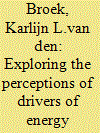

|
|
|
|
|
| Summary/Abstract |
Many models have been applied to predict energy use and savings, yet few studies have investigated people's own perceptions of what drives their energy use. Understanding these perceptions can help design energy policy that is likely to be trusted and perceived as credible. This study assessed the perception of the drivers of energy use among young adults, who had recently become independent energy consumers, but were not yet paying for their energy bills. Focus groups were conducted in which the drivers of energy use were discussed, and discussions were analysed using a framework of a successful existing behavioural model – the Comprehensive Action Determination Model – that includes both conscious and unconscious drivers of energy consumption. The findings show (1) participants did not tend to believe they saved energy to conserve the environment, (2) adherence to egoistic values, apparent in the lack of motivation to save energy in the absence of financial incentives, and (3) strong awareness of energy habits. Policy makers targeting young adults' energy use are advised how to align energy policy with these perceptions.
|
|
|
|
|
|
|
|
|
|
|
|
|
|
|
|
| 6 |
ID:
150361
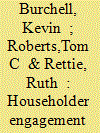

|
|
|
|
|
| Summary/Abstract |
The provision of energy consumption feedback on in-home displays (IHDs) has a prominent role in government strategies for domestic energy demand reduction. Research suggests that IHDs can support energy consumption reduction, but also that engagement with IHDs can be limited to men and is often short-term. In this paper, we draw on research carried out in Smart Communities, a two-year project in which electricity and gas consumption feedback played a key role. This study was distinctive because it was accompanied by a weekly email communications programme and was provided within the context of community action. Project findings suggest that, although by no means panaceas, approaches such as these can support long-term engagement with energy consumption feedback, including by women, and can support behaviour change.
|
|
|
|
|
|
|
|
|
|
|
|
|
|
|
|
| 7 |
ID:
101450
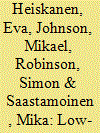

|
|
|
|
|
| Publication |
2010.
|
| Summary/Abstract |
Previous attempts to change energy-related behaviour were targeted at individuals as consumers of energy. Recent literature has suggested that more focus should be placed on the community level and that energy users should be engaged in the role of citizens, and not only that of consumers. This article analyses different types of emerging low-carbon communities as a context for individual behavioural change. The focus is on how these communities offer solutions to problems in previous attempts to change individual behaviour. These problems include social dilemmas, social conventions, socio-technical infrastructures and the helplessness of individuals. Different community types are examined, including geographical communities as well as sector-based, interest-based and smart mob communities. Through four case studies representing each of these community types, we examine how different communities reframe problems on the individual level to reduce carbon emissions. On the basis of an analysis of the strengths and weaknesses of various community solutions, implications are drawn for further research and for the design and support of low-carbon communities
|
|
|
|
|
|
|
|
|
|
|
|
|
|
|
|
| 8 |
ID:
101454


|
|
|
|
|
| Publication |
2010.
|
| Summary/Abstract |
Transitioning to low carbon communities requires an understanding of community practices and resultant emissions, as well as the technologies, infrastructures and institutions associated with and accessed by communities. Moreover, it requires an understanding of the connections between these integrated system components, its dynamics, a defined transition and potential 'levers' involved in 'transitioning'. This paper accepts the notion that 'levers' include programmes designed to achieve practice or behaviour change in households which result in less carbon intensive lifestyles, and focuses on the factors that shape human behaviour and influence householder energy consumption. Research to date by the authors and others indicates that a comprehensive socio-technical framework that considers both individual psychological factors as well as the systems, standards and norms under which individuals operate is fundamental to the development of successful strategies to shift towards low carbon communities.
A database has been compiled of over one hundred local programmes aimed at realising carbon neutral communities across Australia largely through approaches to behaviour change. This paper presents the findings of an analysis of these programmes, particularly with regard to the extent to which they take account of a socio-technical framework or understanding of domestic consumption behaviours and whether they are aware of or aim to influence changing standards and expectations around consumption practices within the home. While a number of exemplary community-based programmes adopt an integrated approach to addressing both technical and behavioural dimensions in the shift to low carbon communities, it was found that most fail to take sufficient account of the systems, standards and norms shaping consumption. Conclusions include directions for policy and programme design based on the study findings.
|
|
|
|
|
|
|
|
|
|
|
|
|
|
|
|
|
|
|
|
|